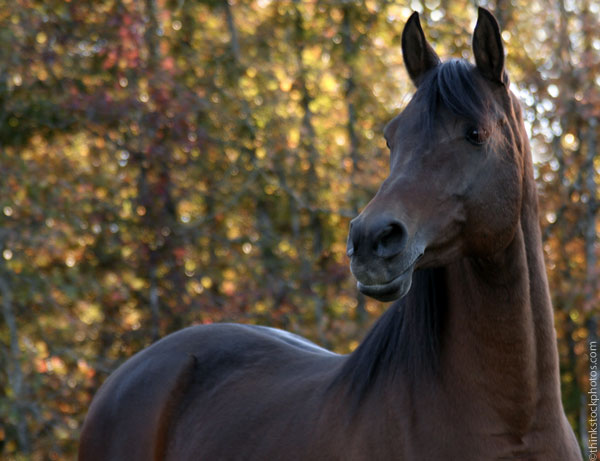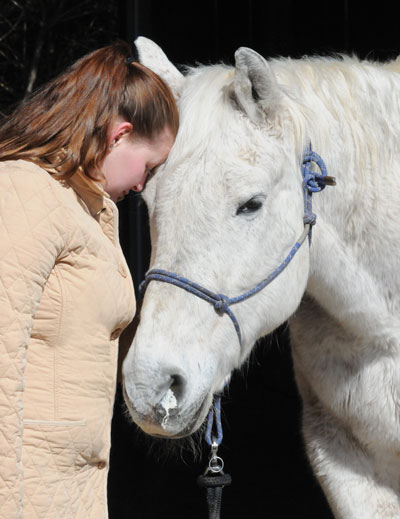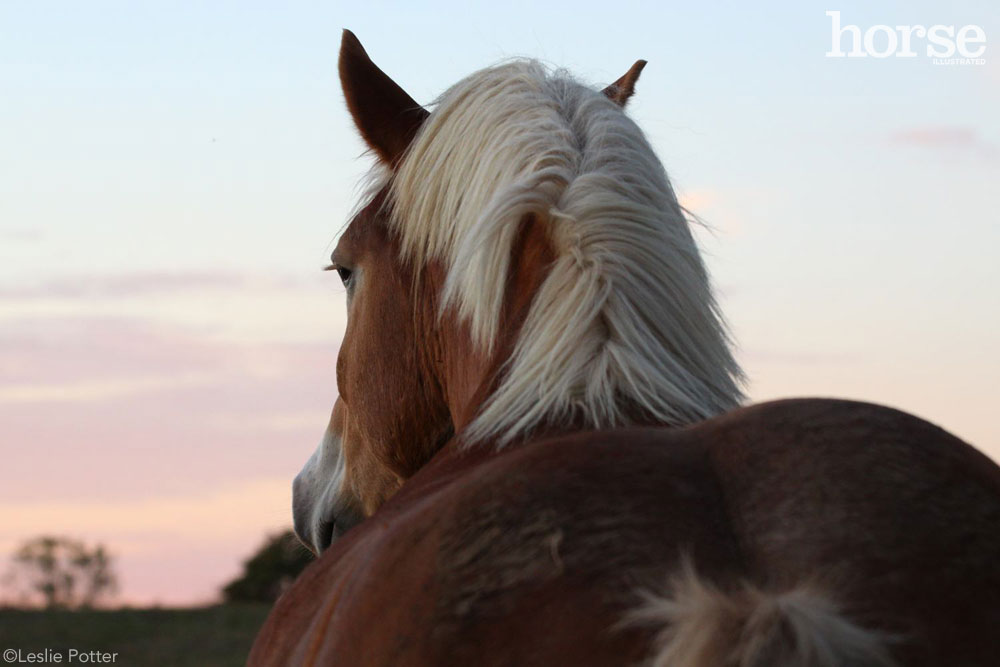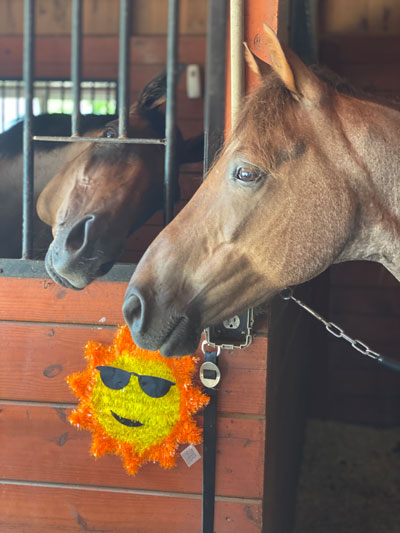
Q: A few months ago, I acquired a 13-year-old Arabian gelding to use as a lesson horse. He was very skinny when he came to me, and I have not been able to put weight on him. I’ve been throwing food at him, but he’s too distracted by the other horses (or their absence) to finish his hay or grain. This is true whether I feed him in his stall or in the pasture. He doesn’t have a nervous temperament. He’s more like a hyperactive toddler, though he’s fairly easy going under saddle. He’s on a deworming program and has had his teeth checked. Other than the weight, he’s bright, alert and seems healthy. What else can I do to put weight on him?
A: Arabians are classically known as a hot-blooded breed, meaning their fiery temperaments and extraordinary endurance lends them toward a fast metabolism. As a breed standard, they tend to be on the slender side, much the opposite of many Quarter Horses or Shetland ponies, who often seem to gain weight simply by breathing. This inherent trait in itself is likely working against your goal of adding some meat to your Arab’s bones.
You say he is distracted both by other horses and their absence. You may try pairing him with a calm, older horse he can bond with, and hopefully form a solid relationship. Also, since he is a lesson horse, try using him with a handful of the same riders every week. You may also consider letting him chill out and have a month or so off from work, then slowly bring him back into lessons. He may simply need some stability in his life if he has a flighty, sensitive disposition. I would be curious about this horse’s history. Finding out anything of significance that happened before you acquired him may help.
Medically speaking, even though he is on a deworming program, have your vet take a stool sample and look at it under the microscope to physically count any parasite eggs and identify their type. Who knows what he’s been dewormed with in the past – there’s a possibility he’s developed a level of resistance to a particular dewormer that just isn’t getting the job done anymore.
Having his teeth floated is an excellent first step in managing a thin horse. I would now recommend having the vet out for a more general physical exam. Sometimes a horse may have an unexpected underlying medical condition like a heart murmur that can affect weight gain. I would also have your vet take a blood sample for cursory blood work: a complete blood count (CBC) and a chemistry panel will tell if there is any chronic inflammation internally, and will check that his white and red blood cell levels are normal. Kidney, liver, muscle, and protein levels are also included in this basic workup.
There’s a very minute chance that he has some sort of enteropathy, or pathology along the lining of his intestine, that prevents him from digesting and absorbing nutrients in a proper manner, although a common sign of this type of disease is chronic diarrhea, which you don’t mention this horse having. I would recommend making all the other changes mentioned in this article first and pursuing this as a last-ditch effort if nothing else works, keeping in mind this would entail an internal medicine specialist and possibly abdominal ultrasounds and even biopsies.
Once any gross medical findings are ruled-out, go back to his diet. You don’t mention what you are feeding him, but I would recommend a senior complete feed for starters because it is easily digestible with lots of fiber and well-balanced nutrients. Don’t throw a high protein/high energy performance feed at him – given his personality, this may make him even more “hot” in the stall, like giving a five-year-old a chocolate cake and then having him bounce off the walls; in both scenarios they are merely burning up the extra calories and not converting them to fat. I would give small meals multiple times a day – at least twice, if not three times daily. Follow the quantity guidelines the feed manufacturer gives for a few weeks, and then slowly increase the amount if needed. Also include high quality hay. Consider a half and half mix of alfalfa with grass hay. Another cheap and easy way of adding pure fat calories without the extra hot energy is to top-dress the grain with vegetable, corn, or canola oil. Start with one tablespoon for each meal and slowly increase to roughly ¼ to 1/3 cup with each meal. (Increase very slowly to reduce the risk of loose stool).
The key here is to make all diet changes gradually. You want the weight gain to be slow and methodical. Purchase a weight tape and record your horse’s weight every two weeks. This will give you quantitative data to refer to as you monitor your efforts.
You may also consider having a dietician look at what you are feeding and make recommendations. Sometimes your local university will have extension agents that will do this for free and sometimes you may have to pay an independent dietician; it depends on where you live.






give him alfalfa! I know people say it makes horses hot but most of the time it doesn’t.
I too just got a skinny arab mare (although not badly thin, just ribby) and have been working with her on it. I found that as she learned to trust me, she’d eat her food with less “thinking” (she would take a mouthful, lift her head and look pensive, chew a bit, “think” some more, and finally eat the mouthful, only to repeat that whole thing over again) and would dribble less food because she’d stop lifting her head suddenly to check out whatever distracted her. I also added black oil sunflower seeds to her feed, and I think they’ve made a difference in her weight, plus her coat is improving as well.
Hi there,
the lady with the excited arab that won’t gain weight probably has ulcers….try treating him for that….Barb
I think the article was full of great advice. Have you tried seperating the horse and brushing him during mealtimes? That has a calming effect and he might eat his grain at least just to spend time with you.I put 200 pounds on Jewel this way, she was a rescue. She freaked out on certain grains, so I like the advice on a cool pelleted feed.
thanks for the advice- got a ribby arab and TB.
I had a TB like that and she had free pasture.
My Arab, “Corporal,” was a hard keeper from the day I bought him at 4 years old, until he passed away at age 27. I agree with being vigilent about your Arab’s teeth, but you can also change his diet with products that were not available 20 years ago. I had great success with the latest formula of Purina Equine Senior, feeding ONLY pelleted grain or supplements, and topping off grass hay with alfalfa. (Straight alfalfa is hard on their liver.) Sometimes he was skinny, but at the end of his life I had figured out how to keep him in good weight.
All of my Arabs are on the thinner side. But most of them are always moving around….most likely to see what trouble they can get into next.
Wish I had been able to read this last year. Fortunately I’ve managed to put weight onto my Mustang mare this winter, but your article would have made it easier.
I have a 23 y.o. qtr horse mare that I’ve had for 5 yrs who had dropped a lot of weight even though she is in good overall health and has had routine deworming/vaccs/teeth exams. I finally hooked up with an actual equine nutritionist and with her help, turned my mare around and gave her a new lease on life. Here’s the diet I have her on: Purina equine sr, soaked beet pulp, stabilized rice bran, soaked whole flax seed (very inexpensive), dash of salt at each feeding, and she gets 2-3 flakes of alfalpha in addition to her regular grass hay. It is best to feed 3 smaller meals a day, which I did at first, but then my schedule changed and I could only do twice a day. After being on her new diet for a week, I also did a 5 day power pak dewormer to zap anything she might have had that regular deworming didn’t get.
She’s been on this new diet for just over two months and she looks so much better. I hope this helps with your Arab.
Rose George
VP, U.S. Nat’l Equestrian Tourism Org.
http://www.trec-usa.org
I have a ribby thoroughbred that simply will not put weight on! I’ve tried everything from rice bran, beet pulp, vegetable oil, and a number of “weight boosters.” Nothing works!
My bad–alfalfa is hard on a horse’s KIDNEYS, not their liver, as I have posted above. To reiterate, I fought keeping weight on MY Arab for 23 years. Straight alfalfa has stems that are harder to chew than a good quality grass hay, which is why I suggest feeding both. By topping off the grass with the alfalfa, my Arab would eat the tiny leaves of alfalfa which would fall on the grass hay, thus keeping his interest in the grass hay, instead of using it as his bedding.
Now that my old herd has passed on, I still feed alfalfa in the winter to my two 5 year old geldings and my 13 year old mare. An old farmer (that I used to buy my hay from) told me that horses are fussy and will eat the tastiest hay first, then eat the other if they are still hungry, so you need to trick them into “eating their veggies”, so to speak, like we do to our children. I hope that this helps the OP. I know what it’s like to have people ask you why you don’t feed your horse. :/ (VERY Irritating, when you are doing your best to put weight on a hard keeper!!)
I have an older guy who did not do the best in the winter. I fed him 4 times a day, small amounts of beet pulp and higher protein grain, which was a mixture of cracked corn, oats, rice, barley, and molassoes. Now he stays fat all winter.